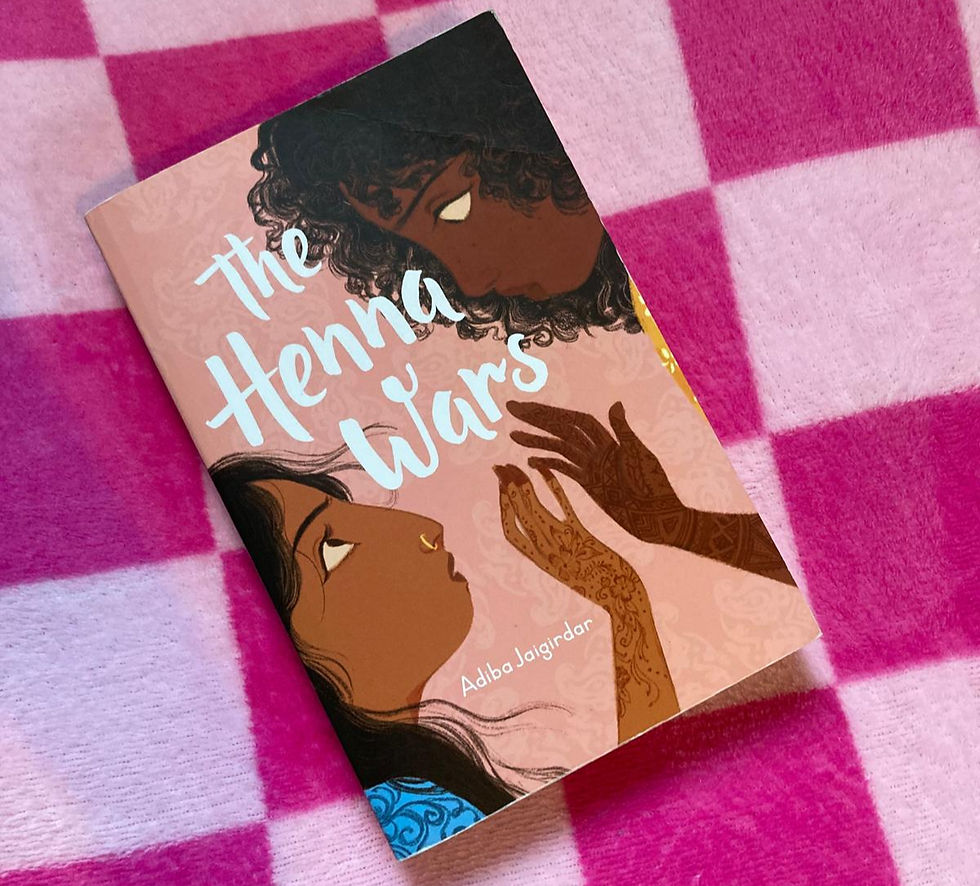Intersectionality and Culture - A review of Adiba Jaigirdar's 'The Henna Wars'
- Ellis May

- Feb 17
- 3 min read
!Spoiler warning!

This book was sold as a romance and I would say that I went into it expecting to kick my feet and squeal like a much younger girl, but I actually found the romance to be the least compelling aspect of the book. I found the romance between Nishat and Flávia unconvincing to say the least. Jaigirdar made Nishat such a well-rounded, loveable character, but I don’t feel she told us enough about Flávia for me to think she was the right match for Nishat, There is no reason for Nishat to really like Flávia, other than a primary school crush and some mild physical attraction. I don’t really buy that Flávia’s good looks alone can keep bringing up feelings in Nishat, even when Nishat is angry with her.
I also felt that Jaigirdar started to make a very interesting point through a revelation Nishat comes to – deciding that she likes Flávia but couldn’t be with her right now because Flávia wasn’t ready to come out. I thought it was a lovely moment where Nishat made it clear that Flávia didn’t have to rush, but that she’d dealt with too much shame throughout her own life to feel good about having a secret relationship. I thought that sent a really good message and had Jaigirdar stuck with this through to the end of the book. I think it would have been a much more interesting and unique addition to the YA genre. Yet suddenly, Flávia was ready to come out and they were together, even though we still hadn’t been given any other reasons they should be together.
However, in spite of this, I found this book to be a really interesting read. I find myself thinking about it a lot, months after reading it, even though I gave it a solid three out of five stars after finishing it. Where this book shines, in my opinion, is in the conversations about Nishat’s sexuality and ethnicity – they are so wonderfully balanced that Jaigirdar presents her reader with a portrait of a truly intersectional identity. I have read too many books about queer people of colour where the conversation has been dominated by discussions of sexuality, and lightly interspersed by random comments about ethnicity that seem to have been included as afterthoughts. Of course, I don’t mean to say that those authors have to write about race in those situations, but it seems to me that those random, out of place comments can come as a result of a last-minute panic and a feeling of obligation to mention ethnicity when they don’t necessarily want to. But Jaigirdar does not do this – she presents Nishat’s ethnicity and sexuality as crucial parts of her identity that do not exist in a vacuum. They are intricately woven in a way that gives the reader a look into a unique and truly intersectional experience.
I also think Jaigirdar’s presentation of Nishat’s homophobic parents is fascinating. She does not tarnish them as the evil villains who won’t love their daughter for who she is, but instead she presents us with carefully worded critique of a wider culture, one with a heavy emphasis on shame, and shows us what that can do to a family in a very tender scene between Nishat and her mother. As a result, I feel the book becomes one that is truly worth reading, despite the slightly underwhelming romance. Jaigirdar gives her novel a level of nuance that it sometimes not given to YA fiction.
Personally, I don’t think Jaigirdar needed to make this a romance; it could simply have been a book about Nishat juggling her Bangladeshi and queer identities in an environment that did not accept her. She could still have had a business rivalry with Flávia, and Nishat could still have realised that Flávia wasn’t that bad after all. Hell, she could have still had a crush on Flávia at the beginning, but I think it would have been a more well-rounded book if instead that crush hadn’t led to a forced romance. I think if Jaigirdar had written that book, it wouldn’t feel so anti-climactic, and it would have been a real gem of a book. Don’t get me wrong, I really did enjoy this book, and I feel like I have really learnt a lot from it, but for me, it's the conversations had on the page that make it worth reading, and not the romance you might be hoping for.
Written by Ellis May



Comentarios